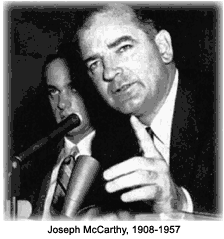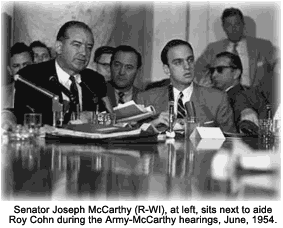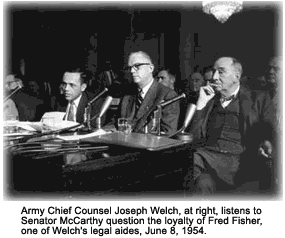 By 1953, Republican Senator Joseph McCarthy had become one of America's best-known politicians through his campaigns to uncover subversives in government operations. His attacks on the U.S. Army in the fall of 1953 led to the first televised hearings in U.S. history, the Army-McCarthy hearings of 1954. The American public watched McCarthy live in action, and they didn't much care for what they saw. Popular approval for McCarthy eroded during the hearings and his eventual fall from power became just a matter of time.
In the fall of 1953, McCarthy conducted an investigation of the Army Signal Corps. His announced intent was to locate an alleged espionage ring, but he turned up nothing. However, McCarthy’s treatment of General Ralph W. Zwicker during that investigation angered many. McCarthy insulted Zwicker's intelligence and commented that he was not fit to wear his uniform.
By 1953, Republican Senator Joseph McCarthy had become one of America's best-known politicians through his campaigns to uncover subversives in government operations. His attacks on the U.S. Army in the fall of 1953 led to the first televised hearings in U.S. history, the Army-McCarthy hearings of 1954. The American public watched McCarthy live in action, and they didn't much care for what they saw. Popular approval for McCarthy eroded during the hearings and his eventual fall from power became just a matter of time.
In the fall of 1953, McCarthy conducted an investigation of the Army Signal Corps. His announced intent was to locate an alleged espionage ring, but he turned up nothing. However, McCarthy’s treatment of General Ralph W. Zwicker during that investigation angered many. McCarthy insulted Zwicker's intelligence and commented that he was not fit to wear his uniform.
 On March 9, 1954, CBS television broadcast Edward R. Murrow’s See It Now program, which was an attack on McCarthy and his methods. Subsequently, the Army released a report charging that McCarthy and his aide, Roy Cohn, had pressured the Army to give favored treatment to G. David Schine, a former McCarthy aide who had been drafted. McCarthy counter-charged that the Army was using Schine as a hostage to exert pressure on McCarthy not to expose communists within its ranks.
The Senate Permanent Subcommittee on Investigations decided to hold hearings that became known as the Army-McCarthy hearings, televised from the Senate Caucus Room. McCarthy relinquished his chairmanship position to Republican Karl Mundt from South Dakota so that the hearings could commence. Both sides of that dispute aired on national television between April 22 and June 17, 1954, for 188 hours of broadcast time in front of 22 million viewers. McCarthy’s frequent interruptions of the proceedings and his calls of "point of order" made him the object of ridicule, and his approval ratings in public opinion polls continued a sharp decline.
On March 9, 1954, CBS television broadcast Edward R. Murrow’s See It Now program, which was an attack on McCarthy and his methods. Subsequently, the Army released a report charging that McCarthy and his aide, Roy Cohn, had pressured the Army to give favored treatment to G. David Schine, a former McCarthy aide who had been drafted. McCarthy counter-charged that the Army was using Schine as a hostage to exert pressure on McCarthy not to expose communists within its ranks.
The Senate Permanent Subcommittee on Investigations decided to hold hearings that became known as the Army-McCarthy hearings, televised from the Senate Caucus Room. McCarthy relinquished his chairmanship position to Republican Karl Mundt from South Dakota so that the hearings could commence. Both sides of that dispute aired on national television between April 22 and June 17, 1954, for 188 hours of broadcast time in front of 22 million viewers. McCarthy’s frequent interruptions of the proceedings and his calls of "point of order" made him the object of ridicule, and his approval ratings in public opinion polls continued a sharp decline.
 On June 9, the hearings reached their moment of greatest drama, when Point of Order.
On June 9, the hearings reached their moment of greatest drama, when Point of Order.